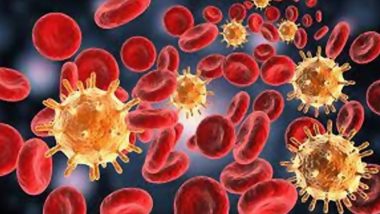Mumbai, May 5: A group of new COVID-19 variants, collectively known as FLiRT, has emerged from Omicron's JN.1 lineage and is currently spreading rapidly in the United States. Comprising variants like KP.2 and KP 1.1, FLiRT is considered more infectious than previous Omicron strains. Despite this, symptoms largely remain unchanged. Experts emphasise the need for vigilance amidst concerns of a potential surge in summer infections.
The term "FLiRT" originates from the technical names of their mutations, as detailed by the Infectious Disease Society of America. Recent reports indicate that KP.2 has become the dominant strain in the US, accounting for a significant portion of new Covid cases. While concerns of a summer surge persist, experts suggest cautious observation. Here's a comprehensive overview of FLiRT, including its symptoms, characteristics, and preventive measures.
What is FLiRT?
A group of new Covid-19 variants, collectively known as FLiRT, has emerged from Omicron's JN.1 lineage. These variants, characterised by mutations denoted by the letters F, L, R, and T in their genetic codes, have garnered attention for their rapid spread and potential impact on disease severity. The most prominent variant within the FLiRT group is KP.2, which has become the dominant strain in the US, accounting for approximately 25% of new COVID-19 cases as of April 2024. COVID-19 Vaccine Side Effects: AstraZeneca Admits Its Coronavirus Vaccine Can Cause Rare Side Effects.
Symptoms and Characteristics
The symptoms associated with FLiRT infection closely mirror those of other Omicron subvariants, including sore throat, cough, fatigue, nasal congestion, runny nose, headache, muscle aches, fever, and potential loss of taste or smell. While FLiRT variants, particularly KP.2, exhibit increased transmissibility compared to previous Omicron subvariants, they also appear to show some level of immune evasion, raising concerns about vaccine effectiveness and immunity from prior infection. What Is Mumps, Viral Infection on Rise in Delhi-NCR, Other States? Know Its Causes, Symptoms and Treatment.
Preventive Measures
The CDC recommends staying updated with vaccinations, testing for COVID-19 when symptomatic or exposed, practising good hand hygiene, ensuring adequate ventilation, wearing masks in crowded indoor settings, and maintaining social distancing.
FLiRT represents a new challenge in the ongoing battle against COVID-19, highlighting the dynamic nature of viral evolution and the importance of adaptive public health responses. By staying informed, following expert guidance, and prioritising collective action, communities can effectively navigate the complexities of emerging variants and work towards containing the spread of the virus.
(The above story first appeared on LatestLY on May 05, 2024 09:51 AM IST. For more news and updates on politics, world, sports, entertainment and lifestyle, log on to our website latestly.com).













 Quickly
Quickly





















